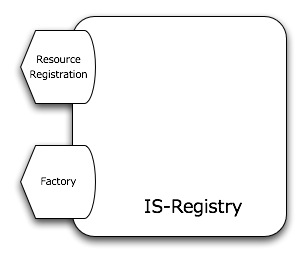Difference between revisions of "IS-Registry"
From Gcube Wiki
Manuele.simi (Talk | contribs) |
Manuele.simi (Talk | contribs) |
||
| Line 1: | Line 1: | ||
| + | |||
| + | |||
| + | == Role == | ||
| + | |||
The IS-Registry is the gateway to entering in a gCube infrastructure for [[Reference Model#Resource Domain|gCube resources]] by means of registering/unregistering their profiles. | The IS-Registry is the gateway to entering in a gCube infrastructure for [[Reference Model#Resource Domain|gCube resources]] by means of registering/unregistering their profiles. | ||
Revision as of 14:47, 8 April 2011
Role
The IS-Registry is the gateway to entering in a gCube infrastructure for gCube resources by means of registering/unregistering their profiles.
The IS-Registry performs three fundamental tasks:
- decide if accept or not a new resource
- validate a resource before its registration
- execute post-deletion actions to keep consistent the IS content
Design
[TBP]
Interface
[TBP]
- The service publishes a set of properties about its operational status including the number of resources of a certain type currently registered, the last operation performed including operation type, resource ID and time RegistryFactoryResource- Such properties are also registered as Topics managed by the IS-Notifier thus making possible for interested clients to subscribe on events representing the changes of status of Infrastructure constituents (e.g. the disappearance of a Running Instance).
Operations
[TBU] The main operations supported by the Service Factory (RegistryFactory) are:
- createResource() – which takes as input parameter a message containing a resource profile and a set of registration directives (e.g. VO membership and VRE membership) and returns a string containing the whole profile of the new resource including the automatically assigned ID;
- updateResource() – which takes as input parameter a message containing the new profile that is supposed to replace an existing one. The key to identify the old profile to be replaced is contained in the profile itself, it is the resource ID. By relying on the internal mapping between IDs and EPRs it identifies the WS-Resource it has to interact with in order to implement such update operation;
- removeResource() – which takes as input parameter a message containing the resource ID identifying the resource to be removed;
Sample Usage
[TBP]
